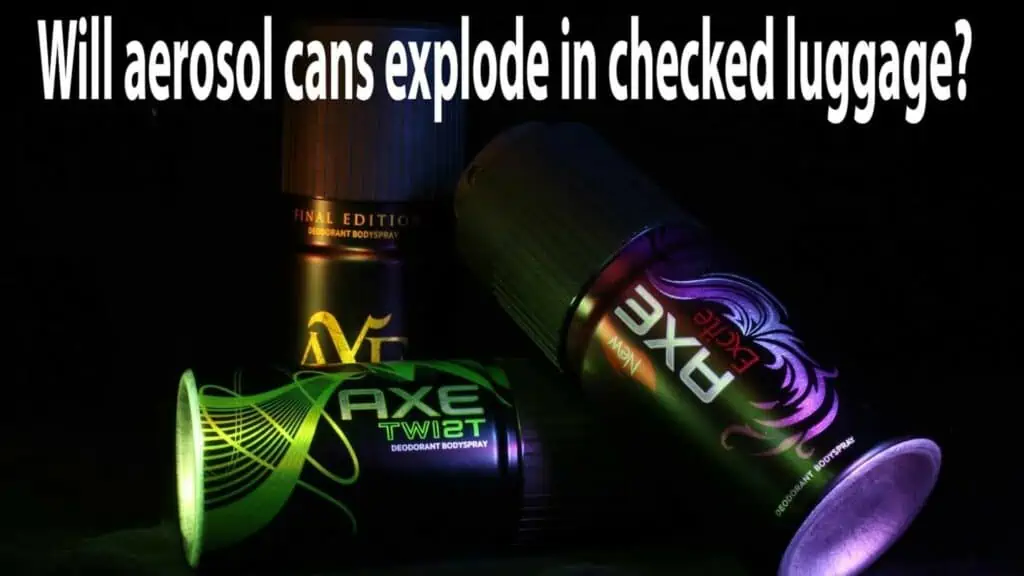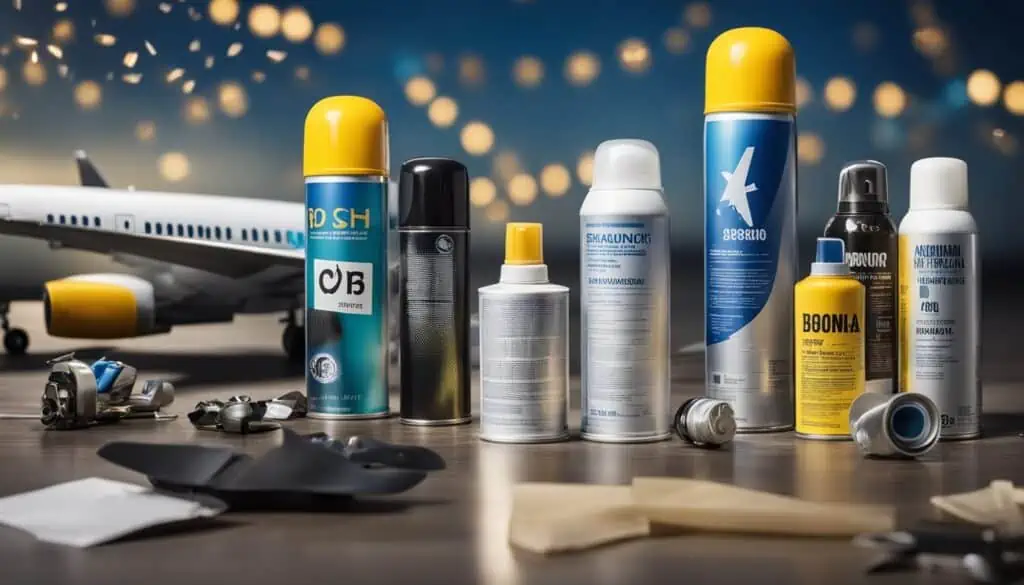Are you worried that your aerosols might go kaboom mid-flight? Traveling can be an anxiety-inducing experience, especially when it comes to what you can pack.
A frequent flyer conundrum is the concern over aerosols in luggage: Will aerosols explode on a plane?
Well, we’ll be going over:
- What are the actual risks of aerosols exploding in checked and carry-on luggage?
- How do aviation safety regulations influence what you can pack?
- What are the best practices for packing aerosols to ensure a safe and compliant journey?
Armed with this knowledge, you’ll be able to pack your bags confidently.

Contents
Will Aerosol Cans Explode on A Plane
Aerosols are unlikely to explode on a plane due to regulated pressure and temperature in cargo holds or in the cabin.
Will Aerosols Explode In Checked Baggage?
Any aerosol in your checked luggage will not explode in the aircraft’s hold. Even if they become damaged, it’s unlikely.
The Federal Aviation Administration (FAA) states that personal care or toiletries aerosols are allowed in checked baggage in limited quantities. They must be protected with caps to prevent accidental release.
The TSA website states that toiletry aerosols in hold luggage must not exceed 70oz (68 fluid ounces) in total and each container must be 18oz (16 fluid ounces) or less.
Products such as sunscreen and non-toiletry aerosols fall under this classification. When packing aerosols in checked luggage, remember that items with a higher risk of explosion or leakage might not be permitted.
- Maximum container size: 18 ounces / 500 ml
- Total allowed quantity: 70 oz / 2 liters
None of the following will explode under normal circumstances (ie. as long as they don’t get damaged):
- Spray sunscreen
- aerosol sunscreen
- pepper spray
- dry shampoo
- shaving cream
- hairspray
- inhaler
- shampoo
- bear spray
- spray deodorant
- mousse
- soda cans
- shaving gel
- fake tan
- champagne
- lotion
- canned food

Will Aerosols Explode In Carry On Bags
Any aerosols allowed in carry-on will be perfectly safe.
There are restrictions, though. In your carry-on luggage, aerosols, gels, creams, and pastes must be in containers of 3.4 ounces (100 milliliters) or less and fit comfortably in one quart-sized Ziploc bag.
Each passenger is limited to one quart-size bag of liquids, which must be placed separately in a tray when passing through the security checkpoint.
Higher-volume aerosols, including pepper spray cans, are prohibited in carry-on bags. To prevent any in-flight risks, it is imperative to verify that the caps are secure and that the container is leak-proof.
- Container size limit: 3.4 ounces / 100 ml
- Bag dimension limit: 1 quart-sized, sealable
My Personal Experience
I have always taken aerosol deodorant on flights in both my carry on (small can) and hold bags. I have never had a problem with them or any other aerosols exploding.
Safe Packing of Aerosols for Flight
When traveling by air, managing your aerosols is crucial to ensure safety and compliance with regulations. Your aerosols must be appropriately packed to prevent leaks due to accidental activation.
When packing aerosol cans in checked baggage to travel in the cargo hold, it’s wise to use plastic wrap under the lid to ensure it is tightly sealed against leaks as a precaution. If a safety device is fitted to the nozzle, then use this. Then, place the canister inside a ziplock plastic bag for added protection.
Always double-check that the aerosol is allowed according to airline and TSA guidelines. Regulations may change, so consult your airline to understand their policies before flying.
- Avoid Overpacking: Overstuffing suitcases can dent or puncture cans.
- Secure Packaging: Use sealed plastic bags to prevent mess if a leak occurs.
- Check Expiry Dates: Older cans might be more prone to leaks or valve failures.
- Look for DOT/UN Labels: Some aerosols have flammability warnings or transport hazard labels.

The Science Behind Why Aerosols Will Not Explode on A Plane?
There are a few reasons why an aerosol may explode, which include fire, extreme heat, or damage, but under normal circumstances, these conditions will never exist in an aircraft’s hold.
Decompression
People’s main worry about aerosols exploding in luggage holds seems to be the pressurization of an aircraft.
However, an aircraft’s baggage hold is pressurized like the passenger cabin, so the air pressure will never be very low.
In theory, if the pressure outside the can were to reduce, this may cause the can to explode due to the higher differential in pressures between the inside and outside. In practice, these pressure changes are not something that will happen.
Even if the aircraft’s pressurization system failed, the difference would not be enough for an aerosol to explode.
Aerosols would not even explode if taken on a space flight and exposed to zero pressure in space.
Fire/Heat
Aerosols may explode if exposed to fire, as extreme temperatures will arise. As the heat increases, the pressure in the cans will increase due to the expansion of the liquids and expellant. This may get to the point where the container’s structure can no longer cope, and it could rupture.
If there should be a fire in the aircraft’s hold, then you will have bigger things to worry about than whether your deodorant may explode.
Damage
Aerosols could burst if containers are punctured by an impact, causing damage. However, if the aerosol product is packed in a suitcase, surrounded by clothes, etc., then this is very unlikely.
Research
The FAA has conducted extensive research on whether aerosol cans will explode in checked bags. This is a link to a report made for the FAA Technical Center looking into the Hazards of Aerosol Cans in Aircraft Cargo Compartments.
Regulations and Guidelines for Aerosol Products
General TSA Regulations
The Transportation Security Administration (TSA) regulates plane aerosols to ensure passenger safety. You can carry aerosols in your checked baggage, but each container should not exceed 18 oz.
The TSA adopts the 3-1-1 liquid rule for carry-on bags, which permits aerosol containers of up to 3.4 ounces or 100 milliliters packed in a single, clear, quart, zip-lock bag. This rule helps to limit the total quantity of liquids, gels, and aerosols to prevent potential on-board hazards.
FAA Guidelines on Aerosols
The Federal Aviation Administration (FAA) prioritizes the safe transportation of hazardous materials, including flammable aerosols. Aerosols are classified under hazardous materials, and they restrict passengers from carrying any flammable aerosols in carry-on and checked baggage without proper packaging and labeling.
The FAA has extensively researched whether aerosol cans will explode in hold baggage. This is a link to a report for the FAA Technical Center looking into the Hazards of Aerosol Cans in Aircraft Cargo Compartments.
Final Thoughts
If they are allowed through airport security (or you bought them in a store after the security checkpoint), your aerosols will be perfectly fine in your carry on bag.
It is perfectly safe if your aerosols are packed in hold bags – they will not explode.
Putting aerosols in checked baggage in a plastic bag would probably be prudent. This is not because they may explode but just in case any aerosols are accidentally activated to prevent contamination of your clothes or other items.
FAQs
Will an inhaler explode on a plane?
No, your inhaler will not explode on a plane. You can pack it in your checked luggage, but it is probably better to have it in your hand luggage if you need it on the flight.
Will spray sunscreen explode on a plane?
Spray sunscreen, whether in pump or aerosol form, will not explode on a plane. If it is smaller than 3.4 oz, you can take it on a plane in your hand luggage. Otherwise, you need to place it in your checked baggage.
Will dry shampoo explode on a plane?
No, dry shampoo in an aerosol can will not explode on a plane. You can take it in your hand luggage, but only if the cans are no larger than 3.4 oz; otherwise, you must put it in your checked baggage.
Will bear spray explode on a plane?
Bear spray will not explode on a plane for a good reason. Bear spray aerosols are banned on planes, either in carry-on or checked baggage.
Will pepper spray explode on an airplane?
Pepper spray in an aerosol can will not explode on an airplane. However, you are not permitted to take any personal defense spray in your cabin bag or through airport security, so you must pack it in your checked luggage.
Will hairspray explode on planes?
No, hair spray will not explode in hand luggage or checked bags on an aircraft. You can take hair spray in your hand luggage, but only if it is no larger than 3.4 ounces; otherwise, it must be packed in hold bags.
Will shaving cream explode on a plane?
Shaving cream will not explode on a plane in carry-on or checked bags. You can take shaving gels and cream in your carry-on bag, but only if they are no larger than 3.4 ounces; otherwise, you must pack them in your checked luggage.
Will a soda can explode in a checked bag?
Soda cans are unlikely to burst or leak in checked baggage unless damaged. If you need to pack them, to be safe, put them in a sealed plastic bag or container so that if they do burst, the contents will not spill over the other contents of your checked bags.
Will champagne explode on a plane?
Champagne bought at the duty-free store or in your checked bags will not explode on a plane if you have it in your cabin bag.
Will bottled water explode in checked luggage?
Bottled water in any form of bottle will not explode when packed in your checked luggage.
Will fake tan explode on a plane?
Fake tan, whether in an aerosol can or any other container, will not explode on a plane in carry on or checked bags.

I have been traveling around the world by air since the early 70s and living overseas too. I worked for British Airways for a number of years and I am also a private pilot. About Me


